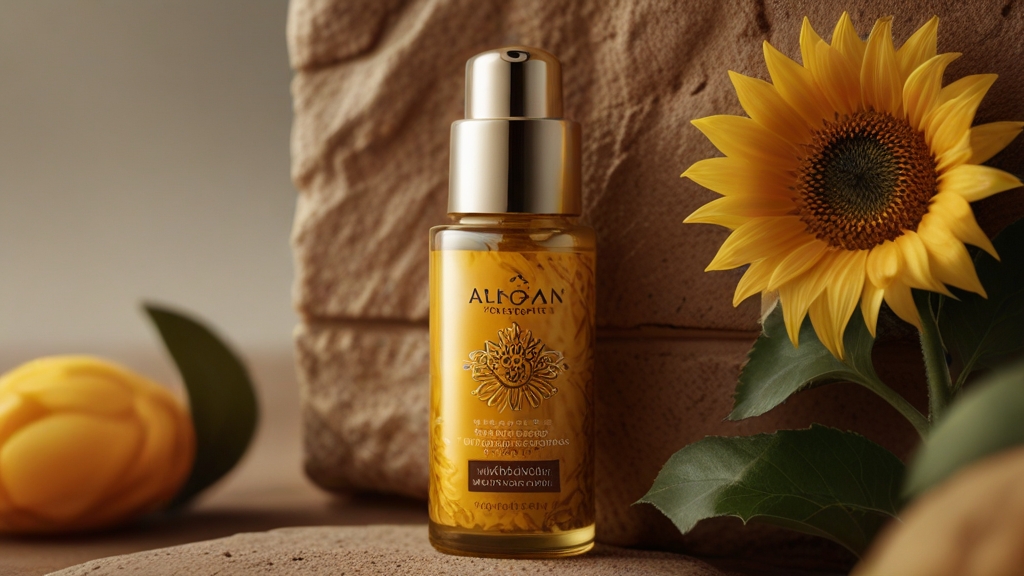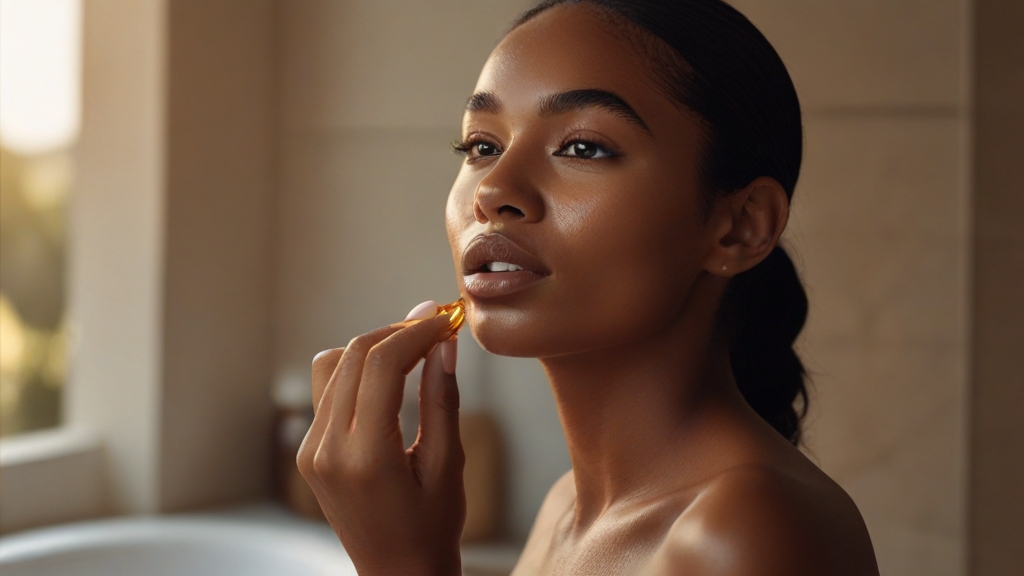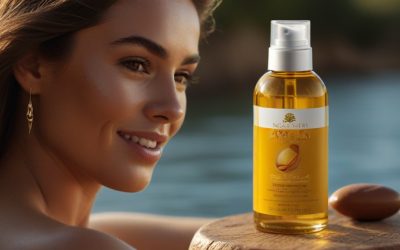
Amira Benhima
A passionate advocate for holistic wellness and natural beauty, is an accomplished author specializing in the benefits and uses of Argan oil, with years of experience exploring its wonders.
Key Takeaways
You may think that the sun’s warm rays are a welcome embrace, but they can wreak havoc on your skin. Sun damage is a real concern, causing premature aging, dark spots, and even skin cancer. But fear not, there is a natural solution that can help restore your skin’s health and radiance. Argan oil, with its potent blend of tocopherols, vitamin E, antioxidants, and Omega oils, has been praised for its ability to repair and protect UV-damaged skin. But how exactly does it work? Stay tuned to discover the secrets behind this miracle oil and how it can transform your sun-damaged skin.- Argan oil repairs and nourishes UV-damaged skin with its high content of vitamin E and antioxidants.
- The antioxidants in argan oil neutralize free radicals and protect skin cells from oxidative stress and inflammation.
- Essential fatty acids in argan oil restore the skin’s lipid barrier and provide hydration and healing for UV-damaged skin.
- Argan oil soothes and heals sunburned skin, reducing redness and inflammation while restoring the skin’s natural barrier.
Benefits of Argan Oil for UV-Damaged Skin
 Using argan oil for UV-damaged skin has several benefits that can help repair and rejuvenate your skin cells. UV radiation from the sun can cause significant damage to your skin, leading to premature aging, sunburn, and an increased risk of skin cancer. However, incorporating argan oil into your skincare routine can provide protection and nourishment for your skin.
One of the key benefits of argan oil is its high content of vitamin E. Vitamin E is a powerful antioxidant that helps neutralize the harmful effects of free radicals caused by UV radiation. By reducing oxidative stress, argan oil promotes skin healing and regeneration, allowing your skin cells to repair themselves more effectively.
In addition to its antioxidant properties, argan oil also acts as a natural moisturizer for UV-damaged skin. UV radiation can strip your skin of its natural moisture, leaving it dry, dehydrated, and dull. Argan oil helps restore hydration to your skin, making it feel softer, smoother, and more supple. Regular use of argan oil can also help reduce the appearance of sun spots and fine lines caused by UV damage, giving your skin a more youthful and radiant appearance.
To protect your skin from UV radiation and enjoy the benefits of argan oil, simply apply a few drops to your clean, dry skin every morning and evening. Massage it gently into your skin until fully absorbed. By incorporating argan oil into your skincare routine, you can protect and nourish your skin, keeping it healthy and radiant despite exposure to the sun’s harmful rays.
Using argan oil for UV-damaged skin has several benefits that can help repair and rejuvenate your skin cells. UV radiation from the sun can cause significant damage to your skin, leading to premature aging, sunburn, and an increased risk of skin cancer. However, incorporating argan oil into your skincare routine can provide protection and nourishment for your skin.
One of the key benefits of argan oil is its high content of vitamin E. Vitamin E is a powerful antioxidant that helps neutralize the harmful effects of free radicals caused by UV radiation. By reducing oxidative stress, argan oil promotes skin healing and regeneration, allowing your skin cells to repair themselves more effectively.
In addition to its antioxidant properties, argan oil also acts as a natural moisturizer for UV-damaged skin. UV radiation can strip your skin of its natural moisture, leaving it dry, dehydrated, and dull. Argan oil helps restore hydration to your skin, making it feel softer, smoother, and more supple. Regular use of argan oil can also help reduce the appearance of sun spots and fine lines caused by UV damage, giving your skin a more youthful and radiant appearance.
To protect your skin from UV radiation and enjoy the benefits of argan oil, simply apply a few drops to your clean, dry skin every morning and evening. Massage it gently into your skin until fully absorbed. By incorporating argan oil into your skincare routine, you can protect and nourish your skin, keeping it healthy and radiant despite exposure to the sun’s harmful rays.
How Argan Oil Repairs Sun-Damaged Skin
 Argan oil effectively repairs sun-damaged skin by deeply hydrating, moisturizing, and promoting collagen production for skin repair and rejuvenation. Here are four ways argan oil helps to repair your sun-damaged skin:
Argan oil effectively repairs sun-damaged skin by deeply hydrating, moisturizing, and promoting collagen production for skin repair and rejuvenation. Here are four ways argan oil helps to repair your sun-damaged skin:
- Deep hydration: Argan oil penetrates deep into the skin, providing intense hydration to replenish moisture lost due to sun exposure. This helps to restore the skin’s natural barrier and improve its overall health and appearance.
- Antioxidant properties: Argan oil is rich in antioxidants, which help combat the negative effects of sun damage. These antioxidants neutralize free radicals caused by UV rays, reducing the appearance of fine lines, wrinkles, and other signs of aging.
- Collagen production: UV rays can break down collagen, the protein responsible for maintaining the skin’s firmness and elasticity. Argan oil stimulates collagen production, helping to repair and restore damaged skin cells. This leads to smoother, more youthful-looking skin.
- Anti-inflammatory properties: Sun damage can cause redness, inflammation, and irritation. Argan oil’s anti-inflammatory properties soothe the skin, reducing redness and calming irritation caused by sunburns or prolonged sun exposure.
The Role of Antioxidants in Argan Oil for Skin Repair
 Antioxidants play a crucial role in repairing UV-damaged skin when it comes to using Argan oil. With its high concentration of vitamin E and polyphenols, Argan oil helps neutralize free radicals, protect skin cells from oxidative stress, reduce inflammation, and promote collagen production. By nourishing your skin with Argan oil regularly, you can naturally repair UV damage, restore skin health, improve elasticity, and reduce signs of sun damage.
Antioxidants play a crucial role in repairing UV-damaged skin when it comes to using Argan oil. With its high concentration of vitamin E and polyphenols, Argan oil helps neutralize free radicals, protect skin cells from oxidative stress, reduce inflammation, and promote collagen production. By nourishing your skin with Argan oil regularly, you can naturally repair UV damage, restore skin health, improve elasticity, and reduce signs of sun damage.
Antioxidant Benefits in Argan Oil
To repair and protect your skin from UV-induced damage, the antioxidant-rich properties of argan oil play a crucial role in promoting skin health and vitality. Here are four key benefits of antioxidants in argan oil:- Neutralize Free Radicals: Antioxidants in argan oil combat the harmful effects of free radicals generated by sun exposure. They help reduce cellular damage and prevent premature aging.
- Combat Oxidative Stress: The high levels of antioxidants, such as vitamin E and polyphenols, in argan oil help combat oxidative stress caused by UV damage. This stress can lead to skin inflammation and DNA damage.
- Shield from Harmful UV Rays: The presence of vitamin E in argan oil plays a vital role in shielding the skin from harmful UV rays. It acts as a natural sunscreen, protecting the skin from sunburn and maintaining its elasticity.
- Repair UV-Damaged Skin: Regular use of argan oil rich in antioxidants can aid in repairing UV-damaged skin. It helps restore the skin’s natural radiance and texture, promoting a healthier and more youthful appearance.
Repairing UV Damage Naturally
Repairing UV damage naturally can be achieved through the powerful antioxidant properties of argan oil. UV damage, caused by exposure to the sun’s harmful rays, can lead to premature aging, sunburn, and skin damage. However, argan oil contains high levels of antioxidants, such as Vitamin E and tocopherols, which neutralize free radicals caused by UV radiation. These antioxidants help repair and protect the skin from further damage. Additionally, the fatty acids present in argan oil strengthen the skin’s lipid barrier, reducing the penetration of UV rays and preventing sun damage. By incorporating argan oil into your skincare routine, you can effectively repair and nourish UV-damaged skin, reducing the appearance of fine lines, wrinkles, and sunburn. Embrace the natural power of argan oil to repair and rejuvenate your skin.Nourishing Skin With Argan Oil
Boost the repair and rejuvenation of your skin by nourishing it with the powerful antioxidants found in argan oil. Here’s how argan oil can help nourish your skin and repair damage caused by the sun:- Antioxidants like vitamin E in argan oil neutralize free radicals, repairing UV-damaged skin.
- The antioxidants in argan oil protect skin cells from oxidative stress caused by sun exposure, promoting repair and rejuvenation.
- Regular application of argan oil can reduce inflammation, redness, and damage caused by UV radiation.
- The antioxidants in argan oil boost collagen production, aiding in the repair of sun-damaged skin and improving elasticity.
Essential Fatty Acids in Argan Oil for UV-Damaged Skin
 Argan oil contains essential fatty acids that are beneficial for repairing UV-damaged skin. These fatty acids, such as oleic acid and linoleic acid, help to restore the skin’s lipid barrier and protect it from further damage. Additionally, oleic acid helps to maintain hydration and elasticity, while linoleic acid reduces inflammation and promotes skin healing. Incorporating argan oil into your skincare routine can provide a valuable solution for repairing and revitalizing UV-damaged skin.
Argan oil contains essential fatty acids that are beneficial for repairing UV-damaged skin. These fatty acids, such as oleic acid and linoleic acid, help to restore the skin’s lipid barrier and protect it from further damage. Additionally, oleic acid helps to maintain hydration and elasticity, while linoleic acid reduces inflammation and promotes skin healing. Incorporating argan oil into your skincare routine can provide a valuable solution for repairing and revitalizing UV-damaged skin.
Benefits of Argan Oil
Using the natural power of argan oil can provide numerous benefits for your UV-damaged skin, thanks to its rich content of essential fatty acids. Here are four reasons why incorporating argan oil into your skincare routine can help repair and protect your skin from sun damage:- Hydration and Nourishment: The essential fatty acids in argan oil, such as oleic acid and linoleic acid, help replenish moisture and nourish your skin, promoting healing and restoring skin elasticity.
- Protection from Oxidative Damage: The high levels of tocopherols (vitamin E) in argan oil act as antioxidants, shielding your skin from oxidative damage caused by UV radiation, reducing sunburn, and preventing premature aging.
- Strengthening the Skin Barrier: Argan oil strengthens your skin’s lipid barrier, creating a protective shield that prevents harmful UV rays from penetrating deep into your skin layers and causing damage.
- Anti-Inflammatory Properties: The anti-inflammatory properties of argan oil help soothe and calm UV-damaged skin, reducing redness, inflammation, and discomfort.
Repairing UV Damage
To repair UV damage and enhance the health of your skin, the essential fatty acids found in argan oil play a crucial role in restoring the skin’s lipid barrier and preventing further damage. These fatty acids, including oleic acid and linoleic acid, help repair UV-damaged skin by enhancing the skin’s natural barrier function. By restoring the lipid barrier, argan oil prevents UV rays from penetrating deep into the skin layers, reducing the risk of further damage. Additionally, argan oil’s antioxidant properties, such as its high levels of tocopherols, protect against oxidative stress caused by UV radiation. Regular use of argan oil can help repair sunburn, fine lines, wrinkles, and premature aging caused by UV exposure, restoring your skin’s health and vitality.| Benefits of Argan Oil for UV-Damaged Skin |
|---|
| – Restores skin’s lipid barrier |
| – Prevents further UV damage |
| – Protects against oxidative stress |
| – Repairs sunburn, fine lines, wrinkles |
Skin Protection Solution
Enhance your skin’s protection against UV damage with the essential fatty acids found in argan oil. Here’s how these fatty acids help shield your skin from sun damage:- Strengthening the lipid barrier: Oleic acid and linoleic acid in argan oil fortify your skin’s natural protective barrier, preventing harmful UV rays from penetrating deep into the skin layers.
- Barrier against oxidative stress: Argan oil acts as a shield against oxidative stress and cellular damage caused by UV radiation. This helps reduce the risk of sunburn, fine lines, and wrinkles.
- Neutralizing free radicals: The high levels of tocopherols (vitamin E) in argan oil neutralize the free radicals generated by UV exposure, protecting the skin from premature aging.
- Repair and nourish: Incorporating argan oil into your skincare routine helps repair and protect sun-damaged skin. It nourishes and hydrates the skin while strengthening its natural defenses.
Argan Oil as a Natural Remedy for Sunburn
 Argan oil is a natural remedy that can effectively soothe and heal sunburned skin. When your skin is exposed to the sun for prolonged periods, it can lead to sunburn, causing redness, inflammation, and pain. But fear not, because argan oil comes to the rescue! With its anti-inflammatory properties, it can help reduce redness and inflammation caused by UV damage. The antioxidants present in argan oil also play a crucial role in repairing and protecting your skin from sunburn.
The deep hydration provided by argan oil is another reason why it is a great natural remedy for sunburn. Sunburn can leave your skin dry and damaged, but applying argan oil can promote healing by providing the much-needed moisture. It can restore the skin’s natural barrier and prevent further damage.
To use argan oil as a natural remedy for sunburn, simply apply a few drops onto the affected area and gently massage it into the skin. You may also mix a few drops with aloe vera gel for added soothing and cooling effects. Repeat this process a few times a day until your sunburn heals.
It’s important to note that while argan oil can provide relief and aid in the repair of sunburned skin, prevention is always better than cure. Make sure to protect your skin from the harmful rays of the sun by applying sunscreen, wearing protective clothing, and seeking shade during peak hours. Incorporating argan oil into your skincare routine can also be beneficial in protecting your skin from sun damage.
Argan oil is a natural remedy that can effectively soothe and heal sunburned skin. When your skin is exposed to the sun for prolonged periods, it can lead to sunburn, causing redness, inflammation, and pain. But fear not, because argan oil comes to the rescue! With its anti-inflammatory properties, it can help reduce redness and inflammation caused by UV damage. The antioxidants present in argan oil also play a crucial role in repairing and protecting your skin from sunburn.
The deep hydration provided by argan oil is another reason why it is a great natural remedy for sunburn. Sunburn can leave your skin dry and damaged, but applying argan oil can promote healing by providing the much-needed moisture. It can restore the skin’s natural barrier and prevent further damage.
To use argan oil as a natural remedy for sunburn, simply apply a few drops onto the affected area and gently massage it into the skin. You may also mix a few drops with aloe vera gel for added soothing and cooling effects. Repeat this process a few times a day until your sunburn heals.
It’s important to note that while argan oil can provide relief and aid in the repair of sunburned skin, prevention is always better than cure. Make sure to protect your skin from the harmful rays of the sun by applying sunscreen, wearing protective clothing, and seeking shade during peak hours. Incorporating argan oil into your skincare routine can also be beneficial in protecting your skin from sun damage.
Incorporating Argan Oil Into Your Skincare Routine
 When incorporating argan oil into your skincare routine, you can effectively repair and protect UV-damaged skin. Here are four steps to help you seamlessly integrate argan oil into your daily regimen:
When incorporating argan oil into your skincare routine, you can effectively repair and protect UV-damaged skin. Here are four steps to help you seamlessly integrate argan oil into your daily regimen:
- Cleanse and tone your skin: Begin by washing your face with a gentle cleanser to remove dirt and impurities. Follow up with a toner to balance your skin’s pH levels and prepare it for further treatment.
- Apply argan oil to sun-damaged areas: After cleansing and toning, take a few drops of argan oil and gently massage it onto the areas of your skin that have been affected by UV damage, such as your face and neck. The antioxidant properties of argan oil will help to combat free radicals and reduce inflammation.
- Allow the oil to absorb: Give the oil some time to penetrate your skin by allowing it to absorb for 10-15 minutes. This will ensure that your skin reaps the full benefits of argan oil’s deep hydration and nourishment.
- Follow up with additional hydrating treatments: Once the argan oil has been absorbed, you can proceed with your regular skincare routine. Consider using a moisturizer or serum to further hydrate and protect your skin.
Tips for Choosing and Using Argan Oil for Sun-Damaged Skin
 To effectively choose and use argan oil for sun-damaged skin, consider these helpful tips. When selecting argan oil, opt for cold-pressed, pure variants to ensure maximum benefits for repairing UV-damaged skin. Look for a product that is free from additives or synthetic ingredients. Once you have your argan oil, apply it directly to the sun-damaged areas of your skin. The oil’s deep hydration properties will nourish and moisturize your skin, while its antioxidant protection will help combat the free radicals caused by sun exposure. Additionally, argan oil supports collagen production, which is crucial for maintaining skin elasticity and firmness. Incorporating argan oil into your evening skincare routine is highly recommended. By using it daily, you can effectively combat the negative effects of sun damage and promote skin rejuvenation. Regular use of argan oil not only helps to improve skin texture but also reduces redness and soothes inflammation caused by sun damage. Embrace the benefits of argan oil to restore your skin’s health, radiance, and overall appearance. Remember, consistency is key when it comes to achieving the best results with argan oil. So, start incorporating this natural remedy into your skincare regimen today and enjoy its transformative effects on your sun-damaged skin.
To effectively choose and use argan oil for sun-damaged skin, consider these helpful tips. When selecting argan oil, opt for cold-pressed, pure variants to ensure maximum benefits for repairing UV-damaged skin. Look for a product that is free from additives or synthetic ingredients. Once you have your argan oil, apply it directly to the sun-damaged areas of your skin. The oil’s deep hydration properties will nourish and moisturize your skin, while its antioxidant protection will help combat the free radicals caused by sun exposure. Additionally, argan oil supports collagen production, which is crucial for maintaining skin elasticity and firmness. Incorporating argan oil into your evening skincare routine is highly recommended. By using it daily, you can effectively combat the negative effects of sun damage and promote skin rejuvenation. Regular use of argan oil not only helps to improve skin texture but also reduces redness and soothes inflammation caused by sun damage. Embrace the benefits of argan oil to restore your skin’s health, radiance, and overall appearance. Remember, consistency is key when it comes to achieving the best results with argan oil. So, start incorporating this natural remedy into your skincare regimen today and enjoy its transformative effects on your sun-damaged skin.
Frequently Asked Questions
Can Argan Oil Repair Damaged Skin?
Yes, argan oil can repair damaged skin. It has skin rejuvenation properties that help reduce signs of aging. The oil’s antioxidants and vitamin E protect against free radicals and promote skin healing. It also aids in sun damage repair by restoring the skin’s barrier. Regular use of argan oil can improve skin texture and restore overall skin health. Incorporating argan oil into your skincare routine is an effective way to repair and protect damaged skin.Does Argan Oil Help With Skin Discoloration?
Using argan oil can help improve skin discoloration caused by UV damage. This natural oil contains antioxidants and vitamin E, which work together to lighten dark spots and even out skin tone. Regular use of argan oil can also hydrate the skin and fade pigmentation, giving you a more radiant complexion. So, if you’re looking for a natural solution to address skin discoloration, consider incorporating argan oil into your skincare routine.What Are the Disadvantages of Argan Oil for Skin?
The disadvantages of argan oil for skin include potential allergic reactions, side effects, and drawbacks. It’s important to note that some individuals with nut allergies may experience allergic reactions when using argan oil. Additionally, impure or diluted argan oil may reduce its effectiveness for skin benefits. Some people may also experience skin problems like irritation or acne from using argan oil. To minimize potential drawbacks, it’s advisable to use pure argan oil.Is Argan Oil Good for Dehydrated Skin?
Yes, argan oil is good for dehydrated skin. It has many benefits, including hydration, moisturization, and reducing dryness. Argan oil contains vitamin E, essential fatty acids, and antioxidants that nourish and hydrate the skin. Regular use of argan oil can improve skin elasticity and hydration levels, making it an excellent choice for replenishing and revitalizing dehydrated skin. So, if you’re looking to hydrate your skin, argan oil is a great option for you.Related Articles
Argan Oil for Reducing Skin Flakiness
Wondering how to banish skin flakiness for good? Discover the remarkable benefits of argan oil and its ability to nourish and hydrate dry, flaky skin.
Argan Oil for Sun-Damaged Skin Repair
Yearning for a natural solution to repair your sun-damaged skin? Discover the incredible benefits of argan oil and unlock the secret to radiant, rejuvenated skin.
Argan Oil Acne Spot Treatment Methods
Join us on a journey into the world of argan oil acne spot treatment and discover the effective methods that can help you achieve clear and radiant skin.


